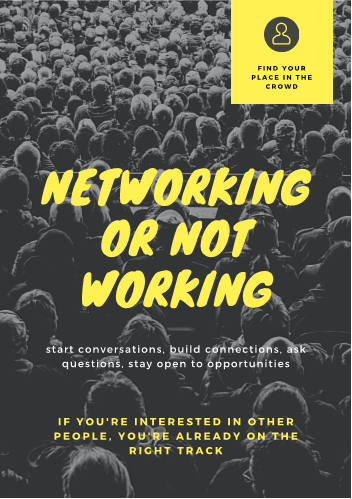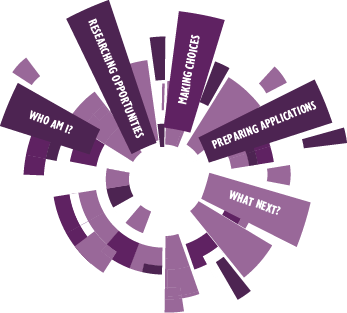In February we launched our PGR Careers Planning ELE page, with bespoke resources taking PGRs through the Career Management Cycle.
This blog post is an extract from this ELE page all about Networking, and was developed by Dr. Kate Massey-Chase, doctoral graduate in Drama.
We are currently surveying our PGRs and find out what other resources you would like us to develop to enhance our PGR Careers Planning ELE page and Beyond Your Research Degree podcast, and in response to the ongoing COVID-19 pandemic through a brief online form here.
Some people shudder at the word ‘networking’, picturing awkward drinks events where you have no idea who to talk to (or how to hold a drink and canapé and eat/drink/talk at the same time). But networking isn’t just about meeting people in the atrium of a conference or going to events with people in shiny suits, aggressively thrusting business cards at you. It’s simply about making and sustaining connections.
You already have networks around you: your supervisors, other colleagues in your department, your research student peers, research networks you belong to, conference working groups, social media groups… So you’re not starting from scratch. But: are you making the most of them?
Ask yourself:
- Do the staff in your department, beyond your immediate team, know you by name?
- Have you positioned yourself as someone who can be asked for a favour? If someone needed an extra pair of hands for an event or had an exciting opportunity to offer, would they think of you?
- If someone in your department was writing a paper that overlapped with your research area, would they know it was your area too?
- Have you attended events run by your College? Or offered to organise any?
- Do you ever email someone after an event to tell them how much you like their work?
- Have you nailed your academic Twitter game?
- Do you forward opportunities to your peers, if you think they might be interested? Do you offer to proof-read their abstracts or applications?
From this list, we can see that networking is not about self-promotion; it’s about dialogue and connection. It’s about being proactive, helpful, generous and kind. You get out what you put in, so it’s up to you to create the research community you want to be a part of.
Of course, this might sound a) daunting, and/or b) horribly time-consuming. You also might feel it puts those with other demands on their time – such as caring responsibilities, part-time work and health needs – at a disadvantage. However, we are not advocating participating in a toxic culture of trying to push, push, push and be everywhere, all of the time, for everyone. We’re not suggesting that research students sign up for lots of unpaid labour (like regularly doing the washing up after events, if the paid staff aren’t also helping). But rather that you think strategically about what you get involved in – and this course aims to help you do that. And yes, for those with multiple demands on their time, it can sometimes feel like a lot to keep on top of. That’s why it’s important that it’s always dialogic and mutually supportive. It only takes a moment to forward an email to a peer telling them about a conference that you think they might be interested in; then, you never know: they might do the same for you.
The harsh reality is: if you don’t build networks, your work and your job prospects will suffer. Your research suffers because you have fewer people to ask for feedback, are exposed to fewer ideas, and are less likely to encounter research at the fore-front of your field. And your job prospects suffer because you miss opportunities and you have fewer people to recommend you.
So, what can you do to build your network?
- Find out what your peers’ research topics are, if you don’t already know, and send them the next call for papers or job opportunity you think might interest them. If they never do the same back, it doesn’t matter because you have done a nice thing. Bonus points if they are students who have the potential to be marginalised in academia (women, disabled people, students of colour, international students).
- Follow people that interest you professionally on Twitter and engage with them (see more about using social media to build your career, below).
- If you are feeling shy at a conference/event, ask a friend or your supervisor to introduce you to people they know; don’t worry too much what you talk about – you don’t always need to do your ‘elevator pitch’ – just see how things progress naturally. If your working group is going for dinner one evening, be brave and don’t just sit with your friends.
- Subscribe to relevant Jisc Mail lists – these are email discussion lists for UK Education and Research communities (you can find mailing lists by category, or ask around which ones your peers/supervisors subscribe to).
- Keep talking! If you are passionate about your work, people will find it interesting (and show interest in others’ work in return). You never know what’s around the corner or who you might meet, so go ahead and chat to people on trains, in cafes, at the pub… This also helps you practice talking about your research in ways that are accessible to diverse audiences.
As well as building your confidence in reaching out to people, making contacts and then nurturing relationships, you can also make use of ready-made networks at the University of Exeter. Some of the networks are listed here, such as the Early Career Research Network, women’s groups and initiatives, and the Parents and Carers Network.
Networking at conferences
If you are looking for more advice about networking at conferences, Heidi Maurer from London School of Economics, offers some sage advice:
 Do not make the mistake of thinking you are only there to present your research. You are there to become part of an academic community, what means that you need to invest time and engage beyond your own panel appearance. When you are part of the audience, show interest and ask questions. We all like engaging audiences, so be one. Also, do not only network with the “big names” in your field (i.e. professors), but also engage with your peers. These are the people with whom you will share the largest part of your career, and it is indispensable to learn, exchange and create supportive networks with one´s peers.
Do not make the mistake of thinking you are only there to present your research. You are there to become part of an academic community, what means that you need to invest time and engage beyond your own panel appearance. When you are part of the audience, show interest and ask questions. We all like engaging audiences, so be one. Also, do not only network with the “big names” in your field (i.e. professors), but also engage with your peers. These are the people with whom you will share the largest part of your career, and it is indispensable to learn, exchange and create supportive networks with one´s peers.
Read more of her advice in her blog: ‘Preparing to Present at an Academic Conference’.
The jobs.ac.uk website also offers practical advice on networking as an academic in their blog ‘Networking: How to Maximize Opportunities and Boost Your Career Connections’, including the importance of opening conversations with questions to get things rolling. Remember: most people like to talk about themselves.

